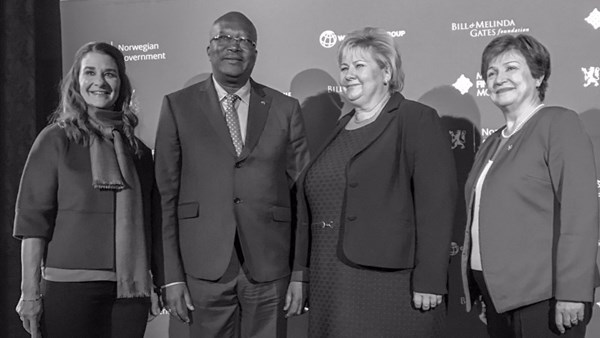- – Ten new investors—Burkina Faso, Côte d’Ivoire, Denmark, the European Commission, Germany, Japan, Laerdal Global Health, the Netherlands, Qatar and an anonymous donor—have joined since the launch of the Global Financing Facility replenishment. They join existing funders the Bill & Melinda Gates Foundation, Canada, MSD for Mothers, Norway, and the United Kingdom to fund the GFF to improve the health and nutrition of women, children and adolescents.
- – US$1 billion pledged to the GFF Trust Fund in Oslo today is expected to link to an additional US$7.5 billion inIDA/IBRD resources for women, children and adolescents’ health and nutrition.
- – Burkina Faso reaffirmed its commitment to allocating at least 15% of its annual budget to improve health; Côte d’Ivoire committed to increasing its health budget 15% annually; and Nigeria recommitted to investing US$150 million per year from its budget to sustainably finance health and nutrition of women, children and adolescents.
- – US$1 billion will help the GFF partnership on the pathway toward expanding to as many as 50 countries with the greatest needs, to transform how health and nutrition are financed. Alongside other global health initiatives, this can contribute to saving and improving millions of lives by 2030.
The Global Financing Facility (GFF) in Support of Every Woman Every Child today announced US$1.005 billion in contributions from the Bill & Melinda Gates Foundation, Burkina Faso, Canada, Côte d’Ivoire the European Commission, Denmark, Germany, Japan, Laerdal Global Health, the Netherlands, Norway, Qatar and the United Kingdom.
“Today there is great hope that the world’s poorest countries can build healthy, vibrant futures where no woman, child or youth is left behind. The GFF partnership is effective and efficient—working with countries to develop the capacity to build and sustain the health systems their women and children need to survive and thrive,” said Erna Solberg, Prime Minister of Norway and Co-Chair of the Sustainable Development Goals Advocates.

This will help the GFF partnership on the pathway toward expanding to as many as 50 countries with the greatest health and nutrition needs and contribute to saving and improving millions of lives by 2030.
The GFF is a catalyst for health financing that is helping countries to transform how they invest in women, children and adolescents because for too long, their health and nutrition has been chronically and persistently de-prioritized and underfunded—resulting in the preventable deaths of 5 million women and children every year.
Statement by Prime Minister Erna Solberg at the first replenishment event of the Global Financing Facility (GFF), Oslo 6 November 2018.
It is a privilege to be hosting all of you here today. Thank you for making the time and effort to come to Oslo to take the Global Financing Facility to the next level.
Let me start with a fact that never fails to bring home to me and my government the enormity of the challenge the world faces.
Every year, more than five million women, children and adolescents die from preventable causes.
They die from conditions or situations that we have the ability to prevent or treat. Conditions, which in many countries aren’t seen as life-threatening or life-limiting at all – like childbirth for example.
For me it is impossible to accept that the number of lives lost every single year is equivalent to the entire population of Norway. Five million lives being wiped out, every single year.
And all because these people cannot access basic health services.
This silent atrocity must stop.
And the GFF is playing a vital role in this effort.
Through innovative solutions like the GFF, we are tackling global health and related SDGs head on.
As co-chair of the SDG advocacy group, I keep insisting that the different SDGs are interlinked. Progress on one goal will create progress on others.
Health is the best example: Improving health services will have direct impact on poverty reduction, on gender equality, on education and on economic growth.
And for that reason, the GFF is a priority for the Norwegian government, and indeed the Norwegian people.
A core aspect for me is GFFs ground-breaking approach of maximising the effects of health-investments.
It is an approach that is helping to ensure that every single human being has the chance to survive and the opportunity to thrive.
We are strong believers in the GFFs potential – it is already working with 27 countries, and more will follow.
By expanding the GFF, more governments will build and strengthen the health systems that millions of people rely on for survival.
We are also strong advocates of its guiding principles – principles that have country-ownership and working in partnerships at the core.
That focus on national ownership is key.
Because for long-lasting change to take root and be sustainable, the countries themselves need to be in charge.
To encourage this, we must change the way health services are viewed. We must stop seeing it as a large expenditure in our budgets, and start seeing it as an investment in our people, and thereby in our economies.
We can create positive, sustainable cycles: healthy populations lead to higher economic growth and prosperity. This, in turn, means that more can be invested in improving services such as health and education.
Creating these cycles is how we reach the SDGs.
A failure to invest today, on the other hand, could amplify problems for decades to come and undermine the potential for economic growth.
Ladies and gentlemen. The Global Financing Facility is an important innovative financing mechanism.
It takes a cross-sector approach, addressing health, family planning and nutrition in consolidated national plans. And it is tailor-made for sustainability because it involves countries’ ministries of finance and domestic financing.
Every country needs to invest in a sustainable future for their population. And the GFF encourages just that.
A recent study showed that 2.6 billion dollars from the GFF can mobilise between 50 and 75 billion dollars from other sources, primarily domestic.
This can contribute to saving as many as 35 million lives by 2030.
Together, we are taking important steps towards saving these lives here today. Let’s make sure we succeed.
Thank you all for your support, your efforts and your commitments, and I look forward to the rest of the day.
Thank you.



